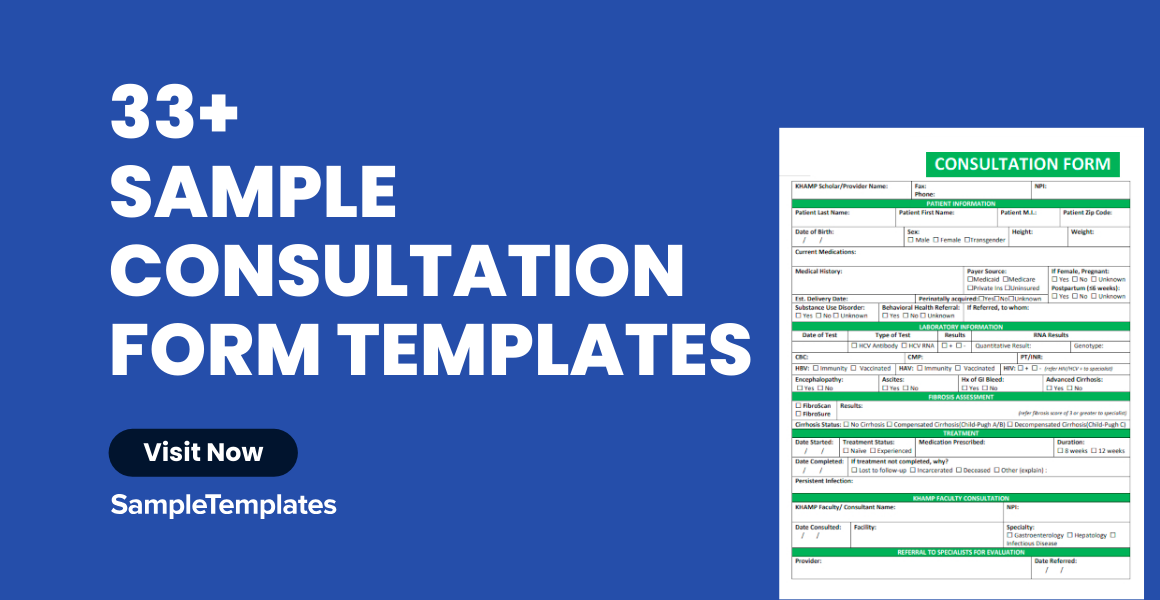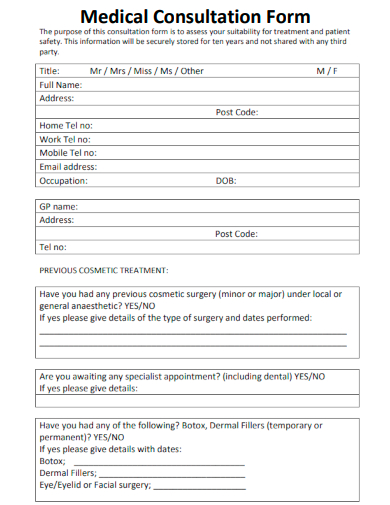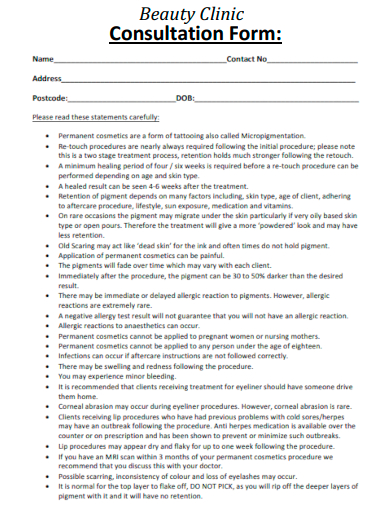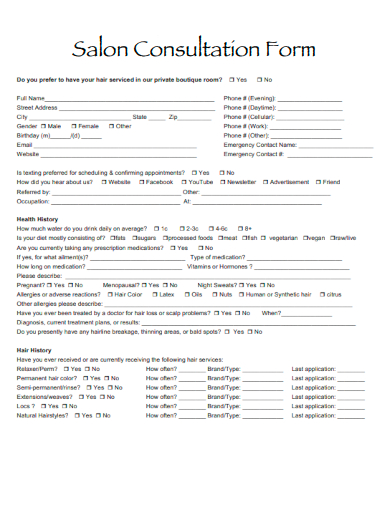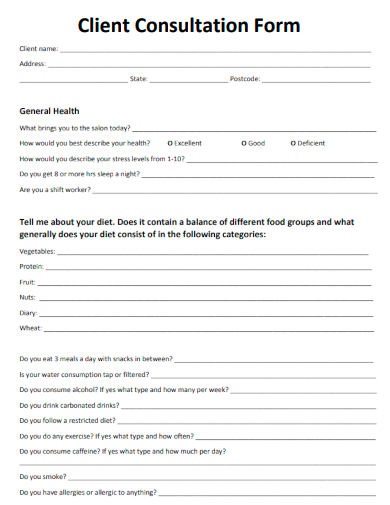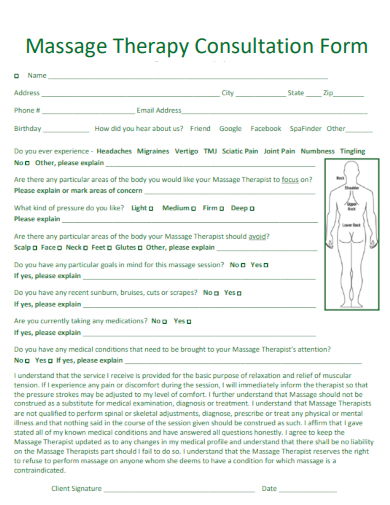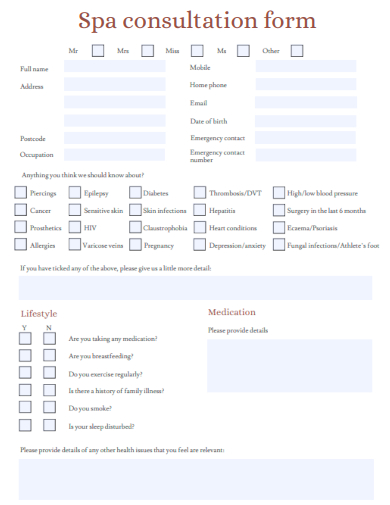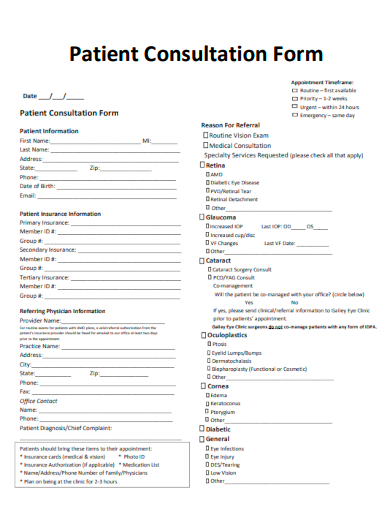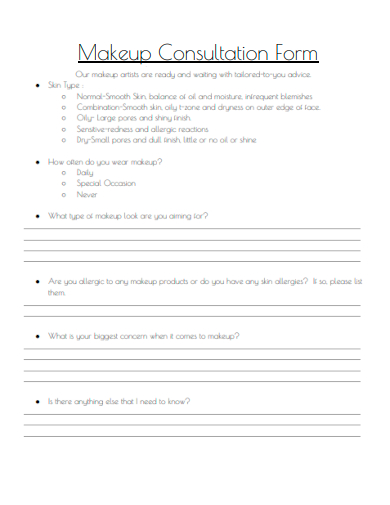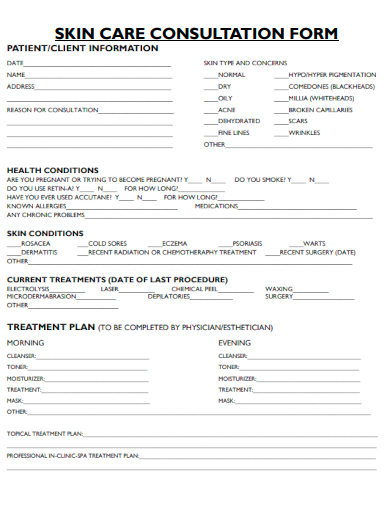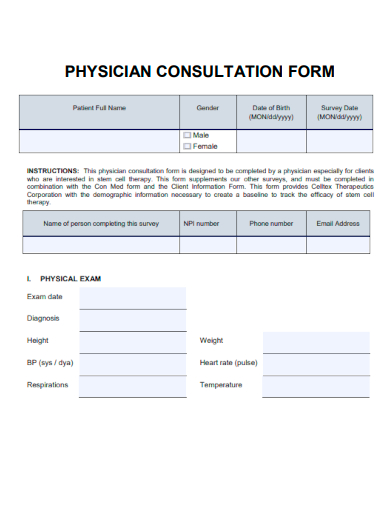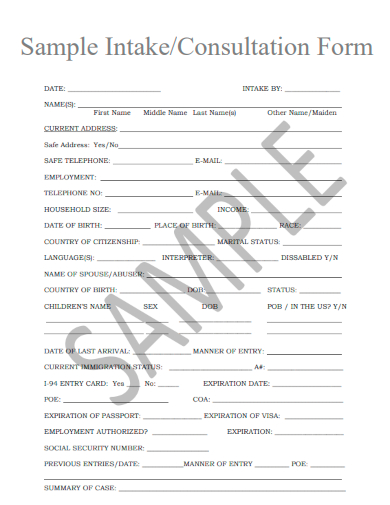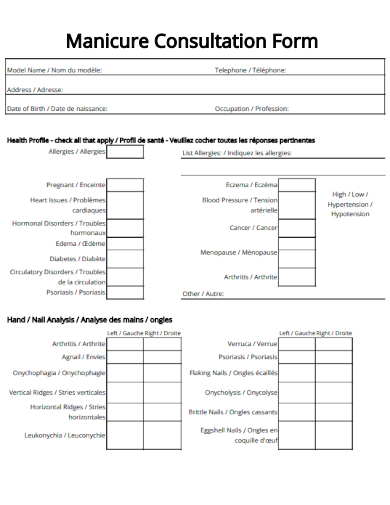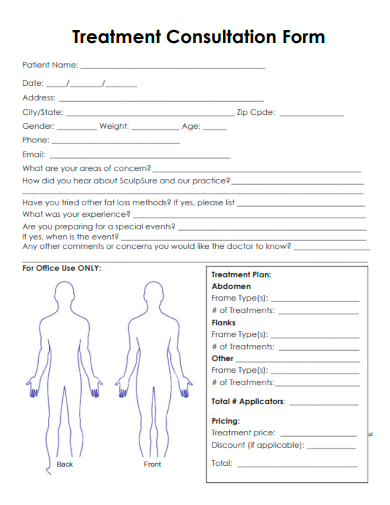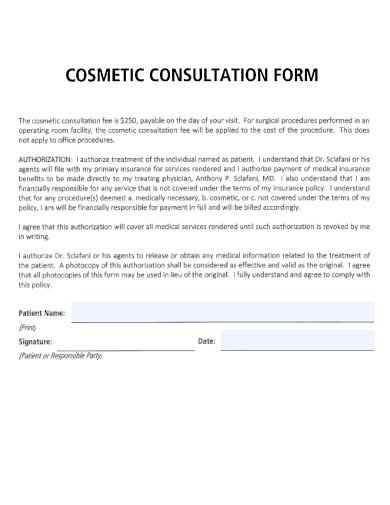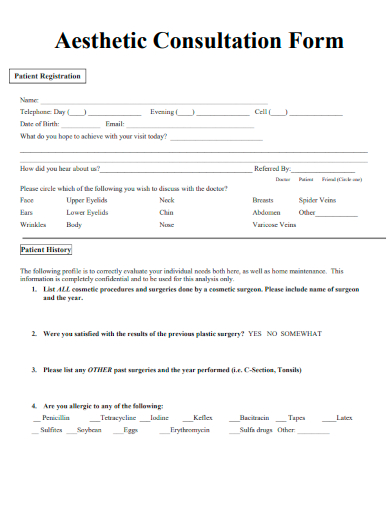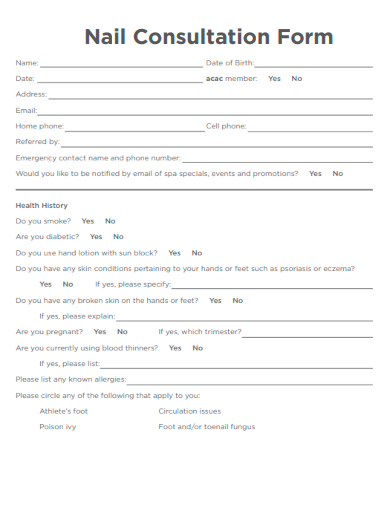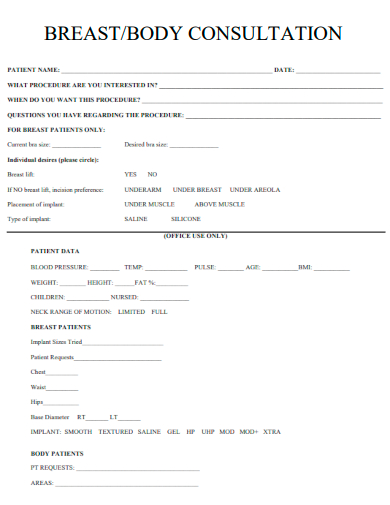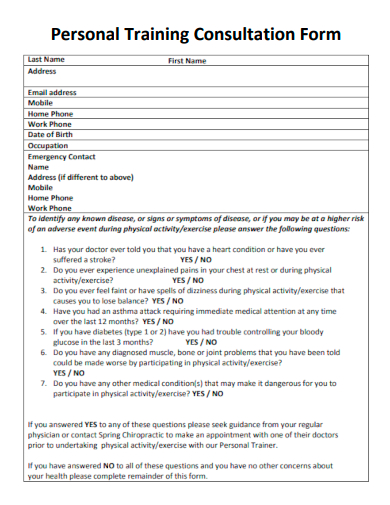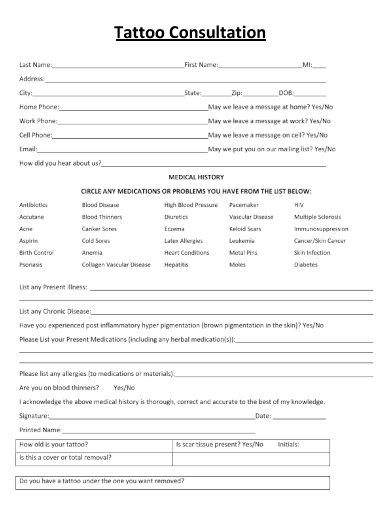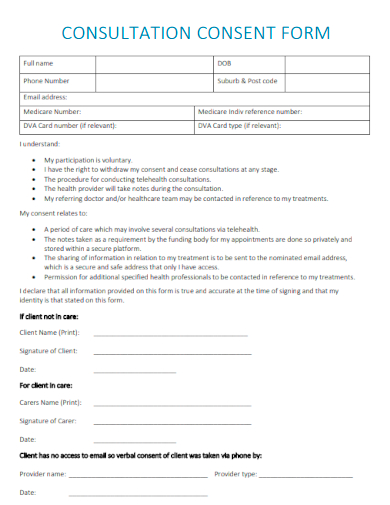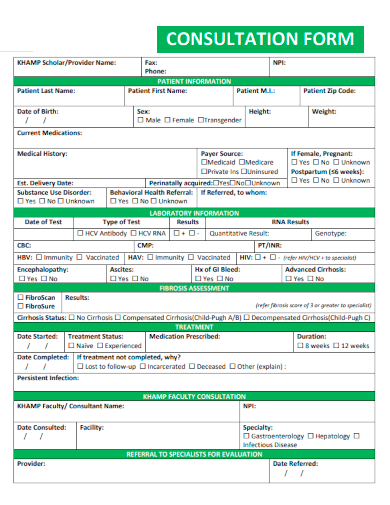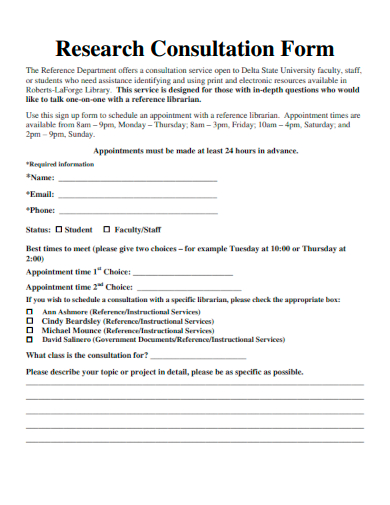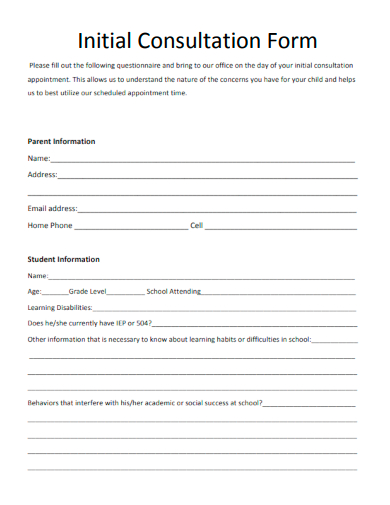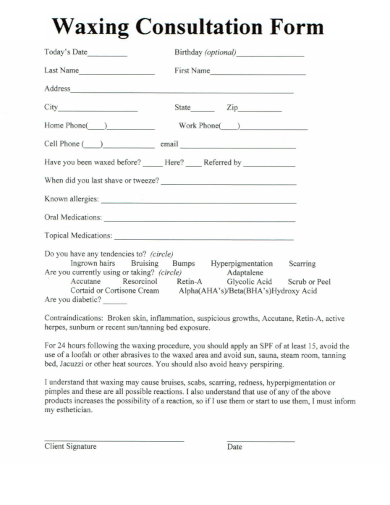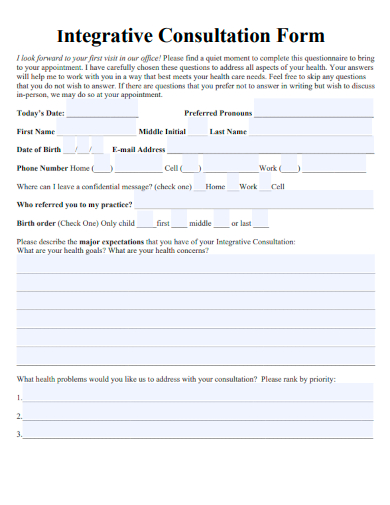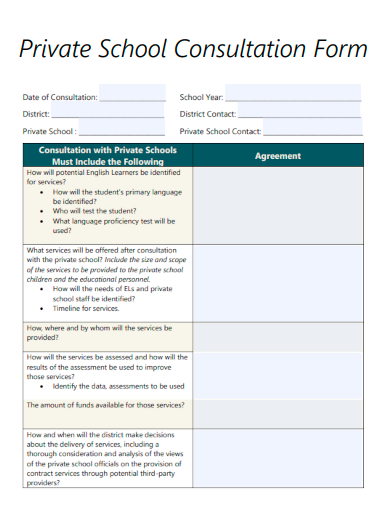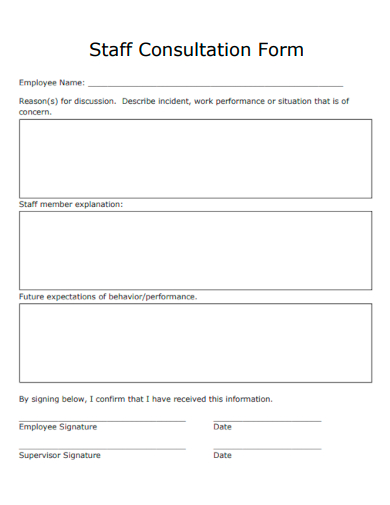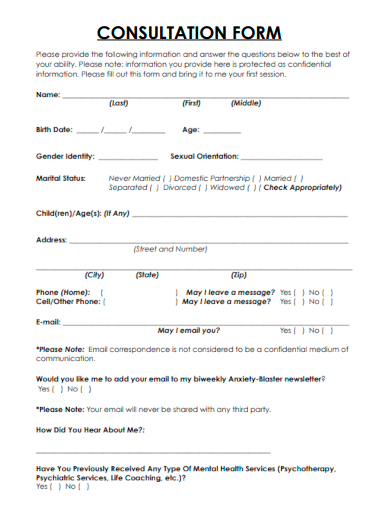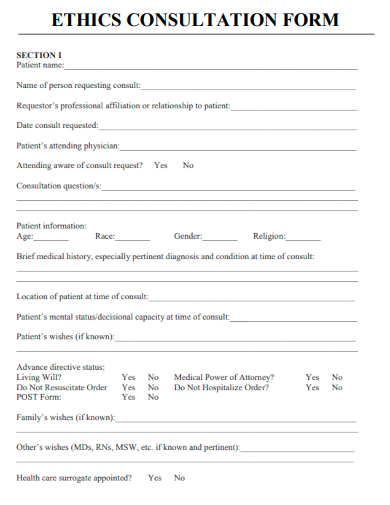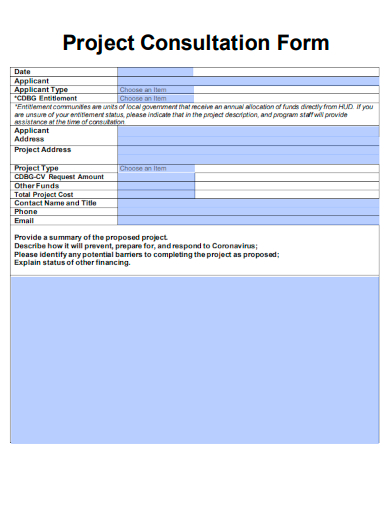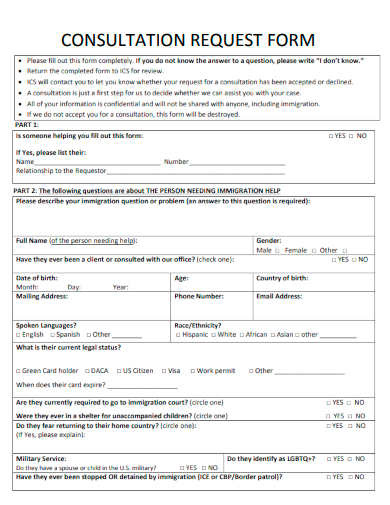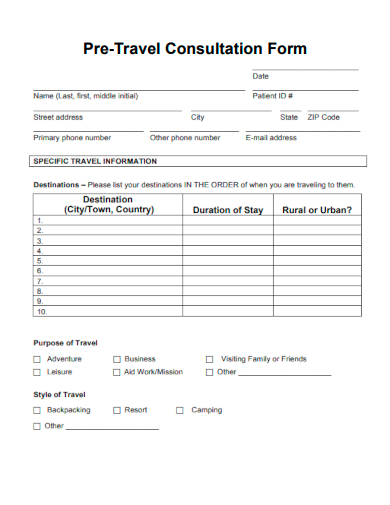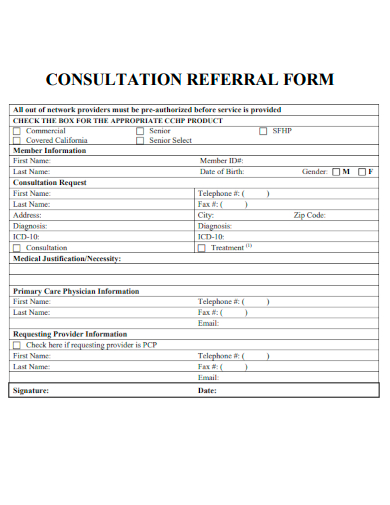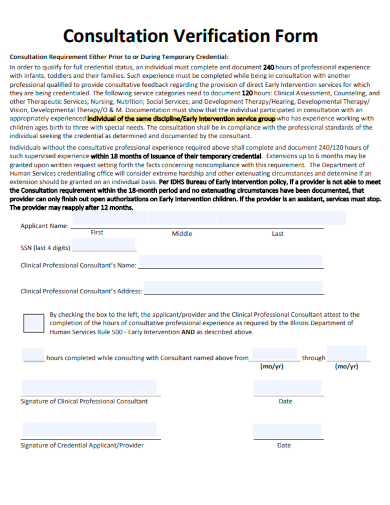In the intricate dance of medical consultations, having the right toolkit is essential. Our Sample Consultation Form Template, integrated with a comprehensive Medical Form, becomes your cornerstone for capturing patient insights and medical histories. Crafted meticulously to align with healthcare standards, this template ensures that each consultation is thorough, accurate, and patient-centric. Delve into this combined solution and redefine your approach to collecting, managing, and analyzing medical consultations with unmatched precision.
FREE 33+ Consultation Form Samples
1. Sample Medical Consultation Form Template
2. Sample Beauty Clinic Consultation Form Template
3. Sample Salon Consultation Form Template
4. Sample Client Consultation Form Templates
5. Sample Massage Therapy Consultation Form Template
6. Sample Spa Consultation Form Template
7. Sample Patient Consultation Form Template
What is a Consultation Form?
A consultation form is a structured document or tool employed by professionals to gather pertinent information from individuals before a consultation session. This foundational step in the consultation process enables the service provider to obtain an initial understanding of the individual’s needs, concerns, history, and objectives. Whether in medicine, law, beauty, or business sectors, consultation forms play a pivotal role in streamlining and enhancing the entire consultation experience, ensuring both parties are well-equipped for their upcoming interaction.
Key Components of a Consultation Form:
Personal details are typically captured at the outset, establishing the primary identification of the individual with basics like name, address, and contact information. Following this, the form usually delves into the primary reason the individual is seeking the consultation, allowing the consultant to align the session with specific needs.
History or background information is another integral part of the form. Depending on the sector, this could encompass medical histories, prior legal interactions, or other relevant backgrounds that might guide the consultation’s trajectory.
Most forms also provide space for individuals to enumerate their immediate concerns or questions. This ensures that these critical topics are front and center during the consultation. Moreover, consent and confidentiality sections are paramount, especially in fields where privacy and informed agreement on procedures or interventions are crucial.
Benefits of Using a Consultation Form:
One of the primary advantages of a consultation form is the enhanced preparation it affords professionals. With preliminary information at their fingertips, they can ensure that consultation time is both efficient and productive. Moreover, this preliminary step often fosters a sense of trust and understanding between clients and professionals, which is vital for fruitful consultations.
For the professional, consultation forms serve as a chronological record of client interactions over time, streamlining follow-ups and continuous service. They also act as a risk management tool, particularly in sectors like health and beauty. For instance, knowing a client’s history and potential allergies can preemptively mitigate potential adverse reactions to treatments. Ultimately, the presence of these forms means that instead of gathering basic information during the consultation, professionals can focus on addressing specific concerns and crafting solutions.
The role of a consultation form goes beyond its basic function as an information collection tool. It establishes the first connection between the client and professional, setting the stage for their ensuing interaction. With the advent of the digital age, consultation forms have transitioned from paper-based to sophisticated online platforms, further enhancing efficiency. Both as a tool for professionals and a means of expression for individuals, the consultation form remains a cornerstone in the world of professional interactions.
8. Sample Makeup Consultation Form Template
9. Sample Skin Care Consultation Form Template
10. Sample Physician Consultation Form Template
11. Sample Intake Consultation Form Template
12. Sample Manicure Consultation Form Template
13. Sample Treatment Consultation Form Template
What Should Be On A Client Consultation Form?
A client consultation form is an essential tool for many professionals. It not only aids in gathering crucial information but also ensures that the consultation process is streamlined, effective, and tailored to the client’s specific needs. Whether you’re in the health, legal, beauty, or any service-oriented industry, having a comprehensive client consultation form can significantly elevate the quality of your service and the satisfaction of your clients.
Personal and Contact Information
At its most basic, the form should capture the client’s personal details. This typically includes their full name, address, contact numbers, and email address. It’s essential to have this information not only for identification but also for future communication and record-keeping.
Purpose of Consultation
It’s crucial to understand why a client is seeking your services. A section dedicated to the reason or objective for the consultation helps professionals gauge the client’s expectations and tailor their approach accordingly.
Background Information
Depending on the nature of your services, capturing relevant background information can be invaluable. For instance, in a medical setting, you’d need a detailed medical history. If you’re a lawyer, understanding previous legal interactions or issues can be essential. For beauty services, understanding skin or hair history can be critical.
Client Concerns and Questions
By providing space for clients to list their immediate concerns, questions, or objectives, you ensure these topics are given priority during the consultation. This section can be an open-ended space or contain specific prompts based on common concerns in your field.
Consent and Confidentiality
In many fields, especially where sensitive information is shared or specific procedures are undertaken, having a section where clients acknowledge and consent to terms related to privacy, procedures, or any interventions is crucial. This can protect both the professional and the client and ensures transparency.
Previous Experience
If relevant to your field, understanding a client’s previous experiences with similar services can offer insights. For example, if you’re a personal trainer, knowing what workout regimes or diets a client has tried before can be informative.
Preferences and Specific Needs
Every client is unique, and understanding their preferences or any specific needs they have can make the consultation more personalized and effective. This can range from preferred appointment times in a salon to communication preferences in a business setting.
Feedback Space
Leaving a section for clients to provide any additional feedback or notes can often yield unexpected yet valuable insights that might not fit into the predefined categories of the form.
A well-crafted client consultation form is more than just a data collection tool. It’s a means of initiating a meaningful dialogue between the professional and the client, setting the stage for a fruitful relationship. By ensuring that all essential components are included, professionals can ensure they are well-prepared to address their clients’ needs and concerns, leading to better outcomes and higher client satisfaction. As the professional landscape evolves, staying attuned to the needs of clients and regularly updating the consultation form to reflect these changes will remain a hallmark of exceptional service.
The Main Purpose of Consultation
Consultation is a collaborative process between individuals, groups, or entities, aimed at decision-making, problem-solving, and sharing expertise. Rooted in open communication, it serves various functions across numerous fields, from medicine to business, and from education to government. While the specific objectives may vary, the underlying principle remains consistent: to facilitate better outcomes through informed discussions and mutual respect.
Decision-making and Problem-solving
One of the primary purposes of consultation is to aid in decision-making and problem-solving. By bringing multiple perspectives to the table, solutions can be more comprehensive, adaptive, and effective. For instance, a company might consult with stakeholders before launching a new product, or a doctor might consult with a patient before deciding on a treatment plan. This interactive process ensures that the resultant decision or solution is grounded in collective insights and is more likely to be accepted and successful.
Sharing Expertise
Another key purpose is the sharing of specialized knowledge. Professionals, such as consultants or advisors, often possess expertise that other individuals or organizations might lack. Through consultation, this expertise is transferred, enabling the consultee to benefit from specialized knowledge without having to attain it firsthand. For instance, a business might hire a financial consultant to navigate complex market dynamics, or a patient might consult a specialist for a rare medical condition.
Building Trust and Enhancing Relationships
Effective consultation is also instrumental in fostering trust and strengthening relationships. When individuals or groups are consulted, they feel valued and heard, fostering mutual respect. Whether it’s a community being consulted about a local infrastructure project or an employee being involved in organizational decision-making, the act of consultation signals that their perspectives matter. This not only enhances trust but also boosts morale and commitment.
Facilitating Buy-in and Reducing Resistance
Change, especially when imposed without consultation, can often meet resistance. However, by consulting with those who will be affected by the change, organizations and individuals can minimize opposition and facilitate smoother transitions. People are more likely to support and adapt to changes when they’ve had a say in shaping them or at least understanding the rationale behind them.
Ensuring Inclusivity
Consultation ensures that diverse voices are heard, promoting inclusivity. By engaging a broad spectrum of stakeholders, consultation processes can address potential blind spots, biases, or oversights. This inclusivity ensures that the resultant decisions, strategies, or solutions are more holistic and equitable.
The essence of consultation lies in its collaborative nature. It’s not merely about seeking advice or ticking off a procedural checkbox. Instead, it’s about valuing collective wisdom, ensuring that decisions are well-informed, and fostering a sense of shared ownership. Whether between a doctor and patient, a government and its citizens, or a business and its employees, the purpose of consultation remains clear: to harness the power of shared knowledge, perspectives, and insights to achieve better, more sustainable outcomes. In an increasingly complex and interconnected world, the role of consultation as a bridge to mutual understanding and effective action cannot be overstated.
14. Sample Cosmetic Consultation Form Template
15. Sample Aesthetic Consultation Form Template
16. Sample Nail Consultation Form Template
17. Sample Body Consultation Form Template
18. Sample Personal Training Consultation Form Template
19. Sample Tattoo Consultation Form Template
20. Sample Consultation Consent Form Template
21. Sample Consultation Form Blank Template
22. Sample Research Consultation Form Template
23. Sample Initial Consultation Form Template
24. Sample Waxing Consultation Form Template
25. Sample Integrative Consultation Form Template
26. Sample Private School Consultation Form Template
27. Sample Staff Consultation Form Template
28. Sample Consultation Standard Form Template
29. Sample Ethics Consultation Form Template
30. Sample Project Consultation Form Template
31. Sample Consultation Request Form Template
32. Sample Pre-Travel Consultation Form Template
33. Sample Consultation Referral Form Template
34. Sample Consultation Verification Form Template
What are the types of consultation?
Consultation is a versatile tool utilized across various sectors, allowing for improved decision-making, knowledge sharing, and collaborative problem-solving. The context in which consultation is employed largely defines its nature and method. Here’s a look at the various types of consultation prevalent in different domains:
Clinical Consultation:
This type of consultation is common in the medical field. A primary care physician might refer a patient to a specialist or seek advice regarding diagnosis or treatment. For instance, a general practitioner might consult with a cardiologist for a patient showing signs of heart problems.
Mental Health Consultation:
Therapists, counselors, or psychologists might engage in consultation with colleagues to gain insights into particular cases, therapeutic techniques, or to seek supervision. This process ensures that patients receive comprehensive care while also supporting the well-being and professional growth of the therapist.
Educational Consultation:
Educators or school administrators might seek consultation to address learning challenges, curriculum development, or institutional policy changes. For example, a school might bring in a special education consultant to aid in creating programs for students with disabilities.
Management or Business Consultation:
Companies often turn to business consultants to address issues like operational efficiency, financial planning, or market strategy. These consultants analyze existing operations and offer recommendations for improvement.
Community Consultation:
This involves seeking input from community members regarding local projects, policies, or interventions. For example, a local government might consult with residents before developing a new park or initiating a public transport project.
Expert or Technical Consultation:
Individuals with specific expertise, such as IT, environmental science, or architecture, might be consulted to offer insights into specialized areas. An example would be consulting with an IT expert to develop a cybersecurity protocol for a company.
Peer Consultation:
This is a process where professionals from similar fields share insights, challenges, and best practices with one another. It’s commonly seen in professions like law, where attorneys might discuss cases (without violating client confidentiality) to gain broader insights.
Process Consultation:
Here, the focus is on improving organizational processes. The consultant observes workflows, team dynamics, and organizational structures to provide feedback and suggestions for enhanced efficiency and productivity.
Policy Consultation:
Governments or large organizations might seek input on draft policies or regulations. This process ensures that a wide range of stakeholders, from experts to the general public, can voice their opinions and concerns, leading to more balanced and comprehensive policies.
Consultation, in its many forms, serves as a bridge between current knowledge and the potential for enhanced understanding and improved outcomes. By engaging in consultation, whether seeking expertise, sharing insights, or collaborating on solutions, individuals and organizations can navigate challenges more effectively, tap into diverse perspectives, and foster a culture of continuous learning and improvement. As society and its challenges evolve, the art and science of consultation will continue to play a pivotal role in shaping solutions, strategies, and success stories.
Related Posts
Sample Sworn Affidavit Forms
Vehicle Inspection Forms Samples & Templates
Sample Employee Advance Forms
Sample Child Travel Consent Forms
Sample Testimonial Request Forms
Sample Employee Details Forms
Sample Divorce Forms
Sample Attestation Forms
Employee Performance Appraisal Form Templates
FREE 9+ Sample Presentation Evaluation Forms in MS Word
FREE 10+ School Admission Form Samples & Templates in MS Word | PDF
FREE 30+ Patient Consent Form Samples in PDF | MS Word
FREE 10+ Sample Sign Off Form Templates in PDF | MS Word
FREE 11+ Sample Medical Consultation Forms in PDF | MS Word
FREE 8+ Sample Donation Forms in PDF | MS Word
